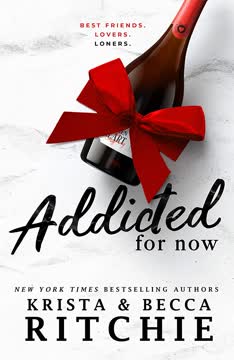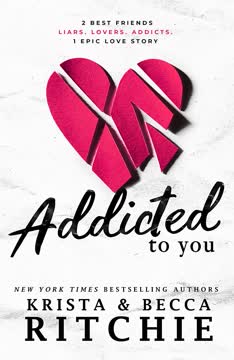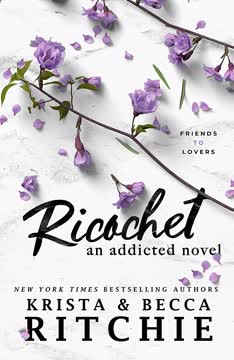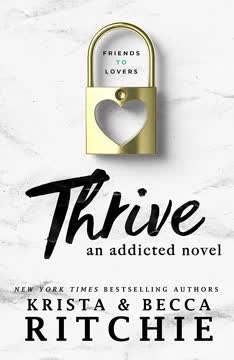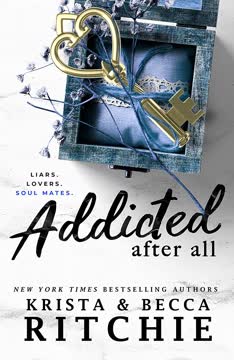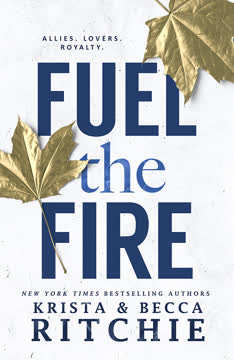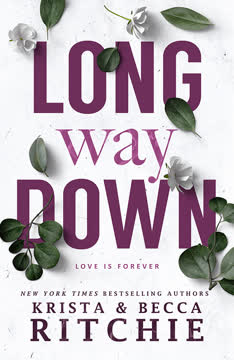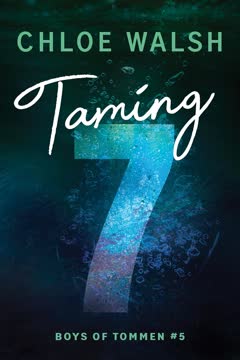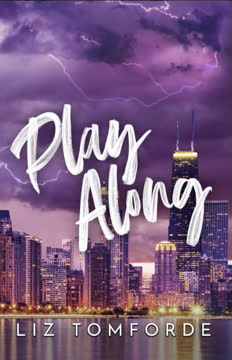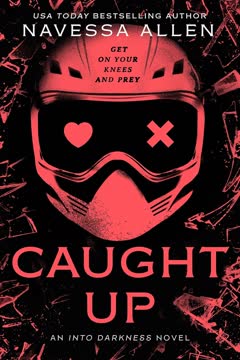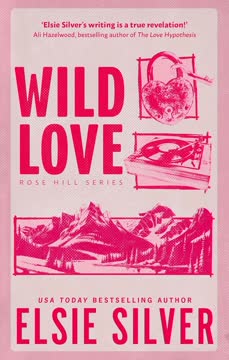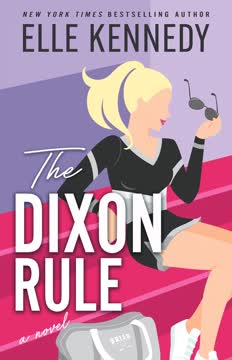Plot Summary
Homecoming Without Bourbon
Lily and Lo reunite after rehab. Lily Calloway anxiously awaits the return of her boyfriend, Loren "Lo" Hale, from rehab. Both are battling addictions—Lily to sex, Lo to alcohol—and their reunion is fraught with nerves, hope, and the weight of their promises to each other. They attempt to establish new boundaries, guided by Lily's therapist's "blacklist" of sexual limitations, and Lo's commitment to sobriety. Their love is palpable, but so is their fear of relapse. The couple's codependency is clear: they are each other's lifeline, but also each other's greatest risk. Their first night together is a test of restraint, intimacy, and the new rules that will define their relationship going forward.
Limits and Blackmail
Boundaries are tested as threats emerge. As Lily and Lo try to navigate their new normal, an anonymous text threatens to expose Lily's sex addiction to the world. The couple, along with their close-knit circle—Rose (Lily's sister), Connor, and Ryke (Lo's half-brother)—form a protective alliance, determined to uncover the blackmailer's identity. The threat of public exposure looms, adding pressure to Lily's recovery and Lo's sobriety. The group's trust is tested as they interrogate each other, unsure who might have leaked Lily's secret. Meanwhile, Lily's struggle with her compulsions is ongoing, and Lo's resolve is challenged by the ever-present lure of alcohol.
The Interrogation Circle
Suspicions and alliances are tested. The group's dynamic is strained as they try to root out the source of the leak. Ryke, Connor, and Rose are all suspects in Lily's eyes, and the tension between Lo and Ryke—brothers with a complicated past—threatens to boil over. The friends debate the ethics of trust, privacy, and loyalty, while also grappling with their own secrets and insecurities. The threat of exposure forces everyone to confront their own vulnerabilities, and the group's unity is both their greatest strength and their Achilles' heel.
Temptations and Triggers
Addiction's grip tightens. Lo and Lily's attempts at a healthy relationship are continually undermined by their addictions. Lo's struggle with sobriety is mirrored by Lily's battle with sexual compulsion. Both are tempted to relapse—Lo by the omnipresence of alcohol, Lily by the ease of self-pleasure and the comfort of old habits. Their mutual support is both a blessing and a curse, as they risk enabling each other. The couple's journey is marked by small victories and painful setbacks, and their love is tested by the reality that recovery is not linear.
Cheating Hearts and Cheating Tests
Academic and moral shortcuts. Lily's academic struggles at Princeton lead her to accept help from Sebastian, Rose's friend, who provides her with old exams. The ethical gray area of "beating the system" is explored, as Lily rationalizes her actions in the face of overwhelming pressure. Meanwhile, the group's efforts to unmask the blackmailer intensify, and the lines between right and wrong blur. The theme of cheating—whether in relationships, academics, or recovery—pervades, highlighting the characters' desperation to survive in a world that feels rigged against them.
The Price of Secrets
Consequences of hidden truths. The threat of Lily's secret being exposed becomes reality when the blackmailer escalates, sending packages and messages that threaten to destroy her reputation and her family's legacy. The group's investigation leads them through a maze of old enemies and unresolved grudges, forcing Lo to confront his own past misdeeds. The cost of secrecy is high, and the characters are forced to reckon with the pain they have caused themselves and each other. The specter of public shame hangs over Lily, and the fear of losing everything becomes a daily reality.
Public Exposure, Private Pain
The world learns Lily's secret. The blackmailer succeeds: Lily's sex addiction is leaked to the press, and the fallout is immediate and brutal. Tabloids, social media, and even strangers on the street turn Lily into a spectacle, and her family's business empire is threatened. The group rallies around her, but the damage is done. Lily is forced to confront the shame and stigma of her addiction in the harshest possible light, and Lo must find a way to support her without losing himself to his own demons. The couple's love is tested as never before, and the question of whether they can survive together is thrown into sharp relief.
The Cancun Experiment
Spring Break as a crucible. The group escapes to Cancun for Spring Break, hoping for respite but finding only new challenges. The trip is a microcosm of their struggles: temptations abound, old wounds are reopened, and the pressure to maintain appearances is overwhelming. Daisy, Lily's youngest sister, joins the group and becomes a focal point for both concern and conflict. The vacation is marked by moments of joy, but also by the ever-present threat of relapse and the reality that running away does not solve their problems.
Daisy's Descent
Innocence lost and boundaries crossed. Daisy's presence in Cancun brings new complications. Her youth and vulnerability are contrasted with the adult world she is thrust into, and her flirtation with Ryke blurs the lines between friendship and something more. Daisy's own struggles with body image, parental neglect, and the pressures of modeling are explored, and her descent into the group's chaos serves as a mirror for Lily's own journey. The theme of lost innocence is central, and the group's attempts to protect Daisy are both noble and fraught with their own issues.
The Fallout and the Fight
Betrayal, confrontation, and heartbreak. The group returns home to face the consequences of the leak and the unraveling of their relationships. Lily's family is devastated, and her parents' response is cold and punitive. Lo's relationship with his own father is equally fraught, and the brothers are forced to confront the legacy of abuse and neglect that has shaped them. The search for the blackmailer reaches a fever pitch, and the revelation of the true culprit is both shocking and deeply personal. The group's unity is tested as never before, and the cost of survival is laid bare.
Family, Forgiveness, and Fallout
Reckoning with the past. The truth about the leak is revealed: Ryke and Lo's mother, Sara Hale, is the blackmailer. Her actions are rooted in her own pain and resentment, but the betrayal devastates Ryke and threatens to destroy the fragile bonds of family that have been built. The group is forced to confront the reality that the people closest to us can cause the deepest wounds. Forgiveness is not easy, and the path to healing is long and uncertain. The theme of family—chosen and biological—is explored in all its complexity.
The Leak Unmasked
The true cost of revenge. Sara Hale's confession is a turning point. Her desire to hurt Jonathan Hale, Lo's father, leads her to betray her own son and the people he loves. The revelation forces Ryke and Lo to redefine their relationship, and the group to reconsider what it means to trust and forgive. The cost of revenge is shown to be higher than anyone anticipated, and the characters are left to pick up the pieces of their shattered lives. The theme of cycles—of pain, addiction, and betrayal—is central, and the hope for breaking free is tenuous but real.
Recovery, Relapse, and Resolve
Moving forward, together and apart. In the aftermath of the leak, Lily and Lo recommit to their recovery and to each other. They face new challenges—Lily's struggle with a predatory therapist, Lo's confrontation with his birth mother, and the ongoing pressures of public scrutiny. The couple's journey is marked by setbacks and small victories, and their love is shown to be both a source of strength and a potential weakness. The importance of honesty, self-forgiveness, and mutual support is emphasized, and the group's unity is reaffirmed in the face of adversity.
The Proposal That Matters
Choosing love on their own terms. After months of turmoil, Lily and Lo reclaim their narrative. Forced into a public engagement for the sake of their families' reputations, Lo proposes to Lily for real, with a ring that symbolizes their true love and commitment. The gesture is simple but profound, and it marks a new beginning for the couple. The story ends with the promise of a future built on honesty, resilience, and the hard-won knowledge that love is not about perfection, but about choosing each other—again and again—no matter what.
Characters
Lily Calloway
Fragile, compulsive, and fiercely loving. Lily is the heart of the story—a young woman battling sex addiction in a world that is quick to judge and slow to understand. Her journey is one of shame, secrecy, and the desperate search for validation. Lily's relationship with Lo is both her salvation and her greatest risk, as their codependency threatens to undermine their recovery. She is deeply insecure, haunted by her mother's neglect and the weight of public exposure. Yet, Lily is also resilient, capable of growth, and ultimately learns to seek help, set boundaries, and fight for her own happiness. Her development is marked by setbacks and small victories, and her love for Lo is both her anchor and her challenge.
Loren "Lo" Hale
Wounded, protective, and striving for redemption. Lo is Lily's partner in both love and addiction. A recovering alcoholic, he is haunted by a legacy of abuse and neglect from his father, Jonathan Hale. Lo's journey is one of self-discovery, as he learns to separate his identity from his addiction and to support Lily without enabling her. His relationship with Ryke, his half-brother, is fraught but ultimately redemptive, and his love for Lily is the driving force behind his recovery. Lo is fiercely intelligent, often sarcastic, and deeply loyal, but he struggles with self-worth and the fear of becoming his father. His growth is marked by moments of vulnerability and the hard-won realization that he deserves happiness.
Ryke Meadows
Blunt, loyal, and searching for belonging. Ryke is Lo's half-brother, a product of Jonathan Hale's affair with Sara Hale. He enters the group as an outsider but quickly becomes a central figure, offering tough love and unwavering support. Ryke's relationship with his mother is complicated, and her betrayal as the leak devastates him. He is fiercely protective of his friends, especially Daisy, and his blunt honesty is both a strength and a source of conflict. Ryke's journey is one of forgiveness—of himself, his family, and those who have hurt him. He is a stabilizing force, willing to sacrifice his own comfort for the sake of others.
Rose Calloway
Ambitious, icy, and fiercely protective. Rose is Lily's older sister, a fashion designer whose company is threatened by the scandal. She is the group's strategist, often taking charge and making difficult decisions. Rose's relationship with Connor is a battle of intellects, and her struggle with intimacy is a recurring theme. She is both a source of strength and a reminder of the cost of perfectionism. Rose's love for her sisters is unwavering, and her willingness to fight for them—even at great personal cost—underscores her complexity.
Connor Cobalt
Brilliant, enigmatic, and morally ambiguous. Connor is Rose's boyfriend, a genius with a penchant for manipulation and a deep-seated need to win. He is both an ally and a challenge to the group, often pushing them to confront uncomfortable truths. Connor's relationship with Rose is a dance of equals, and his loyalty to the group is tested by his own ambitions. He is capable of great kindness, but his motives are often inscrutable. Connor's development is marked by his willingness to be vulnerable and to prioritize love over victory.
Daisy Calloway
Adventurous, vulnerable, and seeking connection. Daisy is the youngest Calloway sister, a model thrust into the adult world before her time. Her flirtation with Ryke and her struggles with body image, parental neglect, and the pressures of fame mirror Lily's own journey. Daisy is both innocent and wise, and her descent into the group's chaos serves as a catalyst for growth and reflection. Her relationship with her sisters is central, and her search for belonging is a recurring theme.
Jonathan Hale
Abusive, powerful, and deeply flawed. Lo and Ryke's father, Jonathan is a complex figure whose love is both a source of pain and a motivator for change. His legacy of abuse shapes Lo's self-perception and his relationships, and his actions—both good and bad—reverberate throughout the story. Jonathan's desire for control and his inability to express love in healthy ways are central to the group's struggles.
Sara Hale
Bitter, vengeful, and ultimately tragic. Ryke's mother and the story's ultimate antagonist, Sara's actions as the leak are rooted in her own pain and resentment. Her betrayal devastates Ryke and forces the group to confront the reality that family can be both a source of love and of deep wounds. Sara's complexity lies in her motivations—she is both a victim and a perpetrator, and her actions have far-reaching consequences.
Sebastian Ross
Cunning, self-serving, and ultimately exposed. Rose's former friend and Lily's tutor, Sebastian is emblematic of the group's struggles with trust and betrayal. His willingness to manipulate and exploit others for his own gain is a cautionary tale, and his eventual ousting is a victory for the group's unity.
Melissa
Jealous, opportunistic, and a catalyst for conflict. Ryke's "somewhat" girlfriend, Melissa's actions—especially her lies to the press—serve as a reminder of the dangers of letting outsiders into the group's inner circle. Her betrayal is both personal and public, and her departure is a necessary step in the group's healing.
Plot Devices
Dual Addictions and Codependency
Parallel struggles, mutual support, and enabling. The narrative structure is built around the parallel journeys of Lily and Lo as they battle their respective addictions. Their codependency is both a source of strength and a risk, as they must learn to support each other without enabling destructive behaviors. The story uses alternating perspectives to highlight the challenges of recovery, the importance of honesty, and the difficulty of breaking old patterns. The theme of addiction is explored not just as a personal struggle, but as a relational and societal issue, with stigma, shame, and the search for validation at its core.
Mystery and Suspense
The blackmailer's identity and the threat of exposure. The central plot device is the anonymous threat to expose Lily's secret, which creates suspense and drives the narrative forward. The group's investigation is marked by red herrings, false accusations, and the eventual revelation that the true culprit is someone close to them. The use of foreshadowing, misdirection, and gradual revelation keeps the reader engaged and underscores the theme that the greatest threats often come from within.
Public vs. Private Selves
The cost of exposure and the search for authenticity. The story explores the tension between public image and private reality, especially in the age of social media and tabloid culture. The characters are forced to confront the ways in which their secrets, once exposed, are distorted and weaponized by the world. The theme of authenticity—of being true to oneself in the face of judgment—is central, and the narrative structure uses public events (press conferences, scandals, reality TV) to highlight the cost of living in the spotlight.
Family Dynamics and Generational Trauma
The legacy of abuse, neglect, and betrayal. The story is deeply concerned with the ways in which family shapes identity, for better and for worse. The characters' struggles are rooted in the legacies of their parents—Jonathan's abuse, Sara's betrayal, Samantha's neglect—and the narrative uses flashbacks, confessions, and confrontations to explore the cyclical nature of trauma. The theme of chosen family—of finding support and love outside of biological ties—is also central, and the group's unity is both a source of hope and a site of conflict.
Recovery as a Nonlinear Journey
Setbacks, small victories, and the importance of support. The narrative structure reflects the reality that recovery is not a straight line. The characters experience relapses, setbacks, and moments of despair, but also small victories and moments of grace. The use of therapy sessions, support groups, and personal reflection highlights the importance of seeking help, being honest, and forgiving oneself. The story resists easy answers, instead emphasizing the ongoing nature of healing.
Analysis
A modern, unflinching portrait of addiction, love, and survival. Addicted for Now is a raw, honest exploration of what it means to love someone—and to try to save yourself—while battling the twin demons of addiction and shame. Krista Ritchie's novel is both a romance and a psychological drama, using the lens of Lily and Lo's relationship to examine the complexities of codependency, the stigma of sex addiction, and the legacy of family trauma. The book's greatest strength is its refusal to offer easy solutions: recovery is shown to be messy, nonlinear, and deeply personal, and the characters' growth is hard-won and incomplete. The story's central lesson is that love is not about perfection, but about choosing each other—again and again—in the face of pain, fear, and uncertainty. In an age obsessed with image and exposure, Addicted for Now is a timely reminder that healing begins with honesty, vulnerability, and the courage to ask for help.
Last updated:
FAQ
Synopsis & Basic Details
What is Addicted for Now about?
- Navigating Post-Rehab Life: Addicted for Now follows Lily Calloway and Loren "Lo" Hale as they attempt to build a healthy, sober relationship after Lo's return from alcohol rehabilitation. Both are battling severe addictions—Lily to sex and Lo to alcohol—and their journey is a raw exploration of codependency, boundaries, and the challenging path to recovery.
- Threat of Exposure: Their fragile new normal is immediately jeopardized by an anonymous blackmailer who threatens to expose Lily's sex addiction to the public, forcing the couple and their close friends (Rose, Connor, and Ryke) into a desperate search for the culprit. This external pressure intensifies their internal struggles and tests the limits of their trust and loyalty.
- Love Amidst Chaos: The narrative delves into the complexities of their love, which is both a lifeline and a potential trigger for their addictions. As they face public scrutiny, family pressures, and personal demons, Lily and Lo must learn to redefine intimacy, support each other without enabling, and fight for a future where their love is a source of strength, not shame.
Why should I read Addicted for Now?
- Raw Addiction Portrayal: The novel offers an unflinching and honest look at the realities of sex addiction and alcoholism, moving beyond typical romance tropes to explore the messy, non-linear journey of recovery. Readers gain deep insight into the psychological and emotional toll of addiction on individuals and their relationships.
- Complex Character Dynamics: Beyond the central couple, the book features a rich ensemble cast whose interconnected lives are fraught with family trauma, hidden secrets, and evolving loyalties. The intricate relationships, particularly the strained yet fiercely protective bonds, provide compelling emotional depth and unexpected turns.
- High-Stakes Emotional Thriller: Seamlessly blending romance with suspense, the story keeps readers on edge with the looming threat of blackmail and public exposure. This external conflict amplifies the internal battles of the characters, creating a narrative that is both deeply personal and dramatically compelling.
What is the background of Addicted for Now?
- Sequel in a Series: Addicted for Now is the second full-length novel in the "Addicted" series, building directly on the events and character developments established in Addicted to You and Ricochet. It continues Lily and Lo's story, assuming prior knowledge of their fake relationship, their individual addictions, and the initial formation of their core friend group.
- Contemporary Setting & Social Commentary: Set primarily in the affluent circles of Princeton, New Jersey, and Philadelphia, the novel grounds its intense emotional drama in a modern context. It subtly critiques societal perceptions of addiction, wealth, and public image, particularly through the lens of tabloid culture and the double standards applied to male versus female sex addiction.
- Authors' Personal Connection: The authors' note highlights their dedication to readers who "took a chance on Lily and Lo and believing that they deserve a happily ever after," emphasizing the challenging nature of the characters' journey and the commitment required from the audience to see it through. This sets a tone for a story that doesn't shy away from difficult themes.
What are the most memorable quotes in Addicted for Now?
- "People talk about you like you're Jesus, but you're not. You only pull out the miracles to save yourself. Which kind of makes you the opposite of Jesus, doesn't it?" (Part One Epigraph): This quote, attributed to Hellion from X-Men, serves as a powerful epigraph, immediately foreshadowing Lo's self-serving tendencies and his journey towards genuine selflessness. It sets a critical tone for his character arc, highlighting his past failures and the immense personal growth he must undergo.
- "I'm yours. I will always be yours, Lily. But now it's time for you to say it." (Chapter 1, Loren Hale): This pivotal line from Lo during their reunion shifts the power dynamic in their relationship, demanding Lily's active participation in their recovery. It underscores the theme of mutual responsibility and Lily's need to overcome her compulsive nature by willingly surrendering control, marking a significant turning point from their previous enabling dynamic.
- "You're my Scott Summers, and without you, I wouldn't be here." (Chapter 49, Lily Calloway): Spoken by Lily to Lo during his moment of deepest despair, this quote is a profound declaration of her love and his transformative impact on her life. Referencing the X-Men character Cyclops (Scott Summers), it symbolizes Lo's evolution into a strong, protective, and reliable figure, affirming his worth and purpose beyond his addiction.
What writing style, narrative choices, and literary techniques does Krista Ritchie use?
- Dual First-Person Perspective: The novel alternates between Lily's and Lo's first-person perspectives, offering intimate access to their internal monologues, fears, and desires. This narrative choice deepens reader empathy and highlights the subjective experience of addiction and recovery, allowing for a nuanced exploration of their individual and shared struggles.
- Intense, Dialogue-Driven Pacing: Ritchie employs fast-paced, often witty, and emotionally charged dialogue that propels the plot forward and reveals character dynamics. The rapid-fire banter, especially between characters like Rose and Connor or Lo and Ryke, serves as both a defense mechanism and a means of expressing deeper truths, creating a sense of immediacy and realism.
- Symbolic Imagery and Pop Culture Allusions: The text is rich with subtle symbolism, such as Lily's "Wolverine" watch representing her inner child or the recurring motif of "barricades" and "walls" symbolizing emotional defenses. Frequent pop culture references, particularly to X-Men comics, provide a unique lens through which characters understand themselves and their relationships, adding layers of meaning and relatability.
Hidden Details & Subtle Connections
What are some minor details that add significant meaning?
- Lily's Wolverine Watch: Early in the book, Lily wears a "Wolverine" watch, a seemingly childish detail that Sebastian Ross dismisses as a "toy." This minor object symbolizes Lily's enduring innocence and her comfort in simple, familiar things, contrasting sharply with the complex, adult nature of her addiction and the public scrutiny she faces. It subtly highlights her vulnerability and the part of her that seeks comfort in the uncomplicated.
- Lo's Arrowhead Necklace: Lo wears an arrowhead necklace given to him by Lily for his twenty-first birthday. This recurring detail, often mentioned during moments of vulnerability or protection, subtly symbolizes his primal, protective instincts towards Lily and his role as her "hunter" or guardian. It's a quiet reminder of his fierce loyalty and his inherent desire to shield her from harm, even when he's struggling himself.
- Rose's OCD and "Normal" Obsession: Rose's subtle OCD tendencies, such as her meticulous folding of clothes or her aversion to dirt, are minor details that gain significance when Sebastian exploits them. This hints at her own underlying anxieties and need for control, revealing a deeper psychological complexity beneath her icy exterior, and foreshadowing her later vulnerability when her life feels out of control.
What are some subtle foreshadowing and callbacks?
- Lo's Past Vandalism: Early mentions of Lo's past acts of vandalism, such as smashing Aaron Wells's wine cellar or slashing tires, subtly foreshadow the blackmailer's motive for revenge. These callbacks establish a history of conflict rooted in Lo's destructive behavior, making the eventual reveal of Mason Nix's involvement (due to the tire slashing) a logical, albeit painful, consequence of his past actions.
- Ryke's "Blunt" Honesty: Ryke's consistent self-description as "blunt and abrasive" (Chapter 37) foreshadows his later, more profound revelations about his own emotional guardedness and his mother's influence. His seemingly simple character trait is a callback to his complex upbringing and his learned defense mechanisms, hinting at the deeper reasons behind his tough exterior.
- Connor's "Wicked" Vocabulary: Lily notes that Connor used to say "wicked smart" and "wicked cool" but stopped, leading her to wonder why. Connor explains he "dumbed down around the intellectually deficient" but also "backed off some of the pretenses" with true friends (Chapter 47). This subtle linguistic shift foreshadows his gradual emotional opening and the shedding of his carefully constructed persona, indicating a deeper level of trust and authenticity in his relationships.
What are some unexpected character connections?
- Daisy's Perceptive Empathy: Despite her youth and seemingly naive demeanor, Daisy often displays surprising emotional intelligence and empathy, particularly towards Lily and Ryke. Her ability to discern Lily's hidden anxieties ("You're not normal. None of us are." - Chapter 37) or Ryke's underlying care for her ("It's nice to know you care." - Chapter 37) creates an unexpected connection that transcends their age difference and challenges the older characters' assumptions about her.
- Sebastian's Manipulative "Friendship" with Rose: Sebastian's long-standing friendship with Rose is revealed to be far more manipulative than initially portrayed. His deliberate actions, like planting cigarettes on Rose's ex-boyfriend or exploiting her OCD, highlight a toxic codependency rooted in his own insecurity and jealousy of Connor. This unexpected dark side of their connection underscores the theme of hidden motives and the deceptive nature of appearances.
- Lo and Rose's Thawing Relationship: Despite their historical animosity (Rose resenting Lo for taking Lily away, Lo's past insults), their relationship subtly thaws throughout the book, particularly as they unite to protect Lily. Their shared concern for Lily's well-being and their joint efforts in managing the crisis (e.g., sifting mail, discussing business) forge an unexpected alliance, demonstrating growth beyond their initial prejudices.
Who are the most significant supporting characters?
- Ryke Meadows: Beyond being Lo's half-brother, Ryke serves as Lo's primary emotional anchor and accountability partner in sobriety. His unwavering loyalty, blunt honesty, and willingness to confront Lo's self-destructive tendencies ("Because you love Lily more than that." - Chapter 10) are crucial to Lo's recovery. He also acts as a protective figure for Daisy, revealing a softer, more empathetic side.
- Connor Cobalt: More than just Rose's boyfriend, Connor is the group's strategic mastermind and a moral compass, albeit a complex one. His intelligence and resourcefulness are vital in investigating the blackmail and navigating the media fallout. His ability to see through facades and offer direct, albeit sometimes harsh, truths ("She needs you." - Chapter 23) pushes both Lily and Lo towards greater self-awareness and growth.
- Daisy Calloway: Lily's youngest sister, Daisy's presence in the narrative highlights the generational impact of family dynamics and the pressures of fame. Her vulnerability, combined with her surprising resilience and perceptive observations, serves as a catalyst for both Lily and Ryke's character development, forcing them to confront their own protective instincts and past mistakes.
Psychological, Emotional, & Relational Analysis
What are some unspoken motivations of the characters?
- Lily's Quest for "Normalcy": Beneath her sex addiction, Lily harbors a deep, unspoken desire for a "normal" life and relationship, a stark contrast to her chaotic upbringing and compulsive behaviors. Her willingness to adhere to the "blacklist" and her yearning for simple intimacy with Lo ("I just want you to hold me." - Chapter 24) reveal a longing for stability and acceptance that her addiction has always masked.
- Lo's Need for Redemption: Lo's fierce protectiveness of Lily and his relentless pursuit of sobriety are driven by an unspoken need for redemption, particularly for his past failures to protect her and his own self-destructive behavior. His desire to be Lily's "Scott Summers" (Chapter 49) reflects his yearning to be a hero, not just for her, but to atone for the "shitty person" he believes he was.
- Rose's Fear of Vulnerability: Rose's icy demeanor, ambition, and intellectual sparring with Connor often mask a profound fear of vulnerability and intimacy. Her reluctance to share a bed with Connor or fully express her emotions stems from a deep-seated need for control, likely a coping mechanism for her mother's overbearing nature and the pressures of her family's legacy.
What psychological complexities do the characters exhibit?
- Lily's Shame and Self-Worth: Lily's sex addiction is deeply intertwined with her feelings of shame and low self-worth, stemming from her mother's perceived neglect. Her compulsive behaviors are a way to fill an emotional void and seek validation, but they ultimately reinforce her self-loathing. Her journey involves confronting this shame and learning to value herself beyond her sexual acts.
- Lo's Self-Punishment and Control: Lo exhibits a complex interplay of self-punishment and a desperate need for control. His past self-destructive behaviors (drinking, provoking fights) and his current rigid adherence to sobriety and Lily's "blacklist" are two sides of the same coin: attempts to exert control over a life that often felt chaotic and to punish himself for perceived failures.
- Connor's Calculated Detachment: Connor's brilliant mind and logical approach often lead to emotional detachment, which serves as a defense mechanism against vulnerability. He processes emotions intellectually rather than feeling them, making him appear cold or manipulative. However, moments of genuine concern and his willingness to break his own "rules" for Rose reveal the depth of his suppressed emotions.
What are the major emotional turning points?
- Lily's Public Orgasm in the Store: This unexpected event (Chapter 23) is a major emotional turning point for Lily, forcing her to confront the involuntary nature of her addiction and the public humiliation it can bring. It shatters her illusion of control and pushes her to seek deeper therapeutic understanding, leading to a breakthrough in her ability to accept comfort without demanding sex.
- Lo's Confrontation with Emily Moore: Lo's meeting with his birth mother (Chapter 47) is a devastating emotional turning point, as he confronts the painful truth of her rejection. This experience, while deeply hurtful, forces him to acknowledge his own pain and vulnerability, leading to a crucial conversation with Lily where he allows himself to be comforted and truly seen.
- Ryke's Breakdown After Sara's Confession: The revelation that his mother, Sara Hale, is the blackmailer (Chapter 51) triggers a profound emotional breakdown for Ryke. This moment shatters his perception of his family and forces him to confront the deep-seated trauma of his parents' feud, leading to a raw, honest embrace with Lo that solidifies their brotherly bond and marks a turning point in his own healing.
How do relationship dynamics evolve?
- Lo and Lily: From Codependency to Mutual Support: Their relationship evolves from a highly codependent dynamic, where they enabled each other's addictions, to one of mutual support and healthy boundaries. Lo's return from rehab initiates this shift, as he takes on the role of setting limits for Lily, and she, in turn, becomes his emotional anchor during his struggles, demonstrating a more balanced partnership.
- Rose and Connor: From Intellectual Sparring to Intimacy: Their relationship deepens from a battle of wits and intellectual debates to a more profound emotional intimacy. Rose's initial resistance to physical closeness and her need for control are challenged by Connor's unwavering presence and his ability to see beyond her defenses. The crisis surrounding Lily's leak and Rose's business struggles forces them to rely on each other in new, vulnerable ways.
- Lo and Ryke: From Resentment to Brotherhood: Their half-brother relationship, initially fraught with resentment and a history of conflict, transforms into a strong, supportive brotherhood. Ryke's consistent presence in Lo's recovery and his eventual breakdown over their mother's betrayal forge an unbreakable bond, demonstrating that shared trauma and mutual support can overcome years of distance and animosity.
Interpretation & Debate
Which parts of the story remain ambiguous or open-ended?
- Long-Term Impact of Public Exposure: While Lily and Lo take steps to manage the fallout of the leak, the long-term societal impact of Lily being publicly outed as a sex addict remains somewhat ambiguous. The novel concludes with their personal triumph, but the ongoing challenges of public perception, future career implications, and the potential for continued harassment are left open for reader interpretation.
- Future of Daisy and Ryke's Relationship: The subtle, yet undeniable, chemistry and complex dynamic between Daisy and Ryke are a significant open-ended element. Despite their age difference and Ryke's attempts to maintain boundaries, their interactions hint at a deeper connection that could evolve into something more, leaving readers to ponder the future of their relationship beyond the scope of this book.
- Full Extent of Parental Influence and Healing: While the novel delves into the generational trauma caused by Jonathan, Sara, and Samantha, the complete healing of these family dynamics remains a work in progress. The characters make strides in confronting their parents and understanding their past, but the long-term reconciliation and the full extent of their parents' capacity for change are not definitively resolved, suggesting an ongoing journey.
What are some debatable, controversial scenes or moments in Addicted for Now?
- Dr. Evans's Aversion Therapy Methods: Dr. Oliver Evans's use of aversion therapy, particularly his shocking Lily for arousal and his explicit threats, is highly controversial. His methods, including exposing himself to Lily, raise serious ethical questions about therapeutic boundaries and patient safety, sparking debate among readers about the effectiveness and morality of such extreme treatments for addiction.
- Lily's Academic "Cheating" with Sebastian: Lily's decision to use Sebastian's old exams to pass her classes, rationalizing it as "beating the system" rather than outright cheating, presents a morally ambiguous situation. This prompts debate about academic integrity, the pressures faced by students, and whether her actions are justifiable given her personal struggles and the external pressures she faces.
- Lo's Aggressive Protection of Lily: Lo's tendency to resort to physical aggression (e.g., punching Mason Nix, confronting the guy at Princeton) to protect Lily, while driven by love, can be seen as a controversial coping mechanism. This raises questions about healthy boundaries in relationships, the cycle of violence, and whether his actions, though effective in the moment, truly represent a healthy path for his own recovery.
Addicted for Now Ending Explained: How It Ends & What It Means
- Reclaiming Their Narrative and Love: The novel culminates with Lo proposing to Lily "for real this time" with a ruby heart-shaped ring, replacing the gaudy diamond forced upon them by their families for public image. This act symbolizes their reclamation of their love and relationship on their own terms, free from external pressures and the lies that previously defined them. It signifies a choice to build a future based on genuine affection and honesty.
- Embracing Imperfection and Mutual Support: The ending emphasizes that their journey is not about achieving perfect recovery or a flawless life, but about embracing their imperfections and committing to mutual support. Lily's decision to return to Allison for therapy and Lo's newfound ability to be vulnerable with his own therapist, Brian, highlight their continued dedication to personal growth, recognizing that recovery is an ongoing, non-linear process.
- A Future Built on Honesty and Choice: The final scenes, including Lo's confrontation with Aaron Wells and his decision to forgive, underscore the theme of breaking cycles of hate and choosing a path of honesty and self-forgiveness. The establishment of "Superheroes & Scones" as their shared venture symbolizes a future where their passions and strengths can converge, creating a life that is authentically theirs, filled with hard-won happiness and the promise of enduring love.
Review Summary
Addicted for Now receives overwhelmingly positive reviews, with readers praising the character development, emotional depth, and realistic portrayal of addiction recovery. Many consider it the best book in the series so far, highlighting the dual POV and the strengthening relationship between Lily and Lo. Readers appreciate the absence of unnecessary drama and the focus on the couple's journey towards healing. Some criticism is directed at pacing issues and the inclusion of side character storylines. Overall, fans are deeply invested in the characters and eagerly anticipate future installments.
Addicted World Series
Similar Books
Download PDF
Download EPUB
.epub digital book format is ideal for reading ebooks on phones, tablets, and e-readers.
